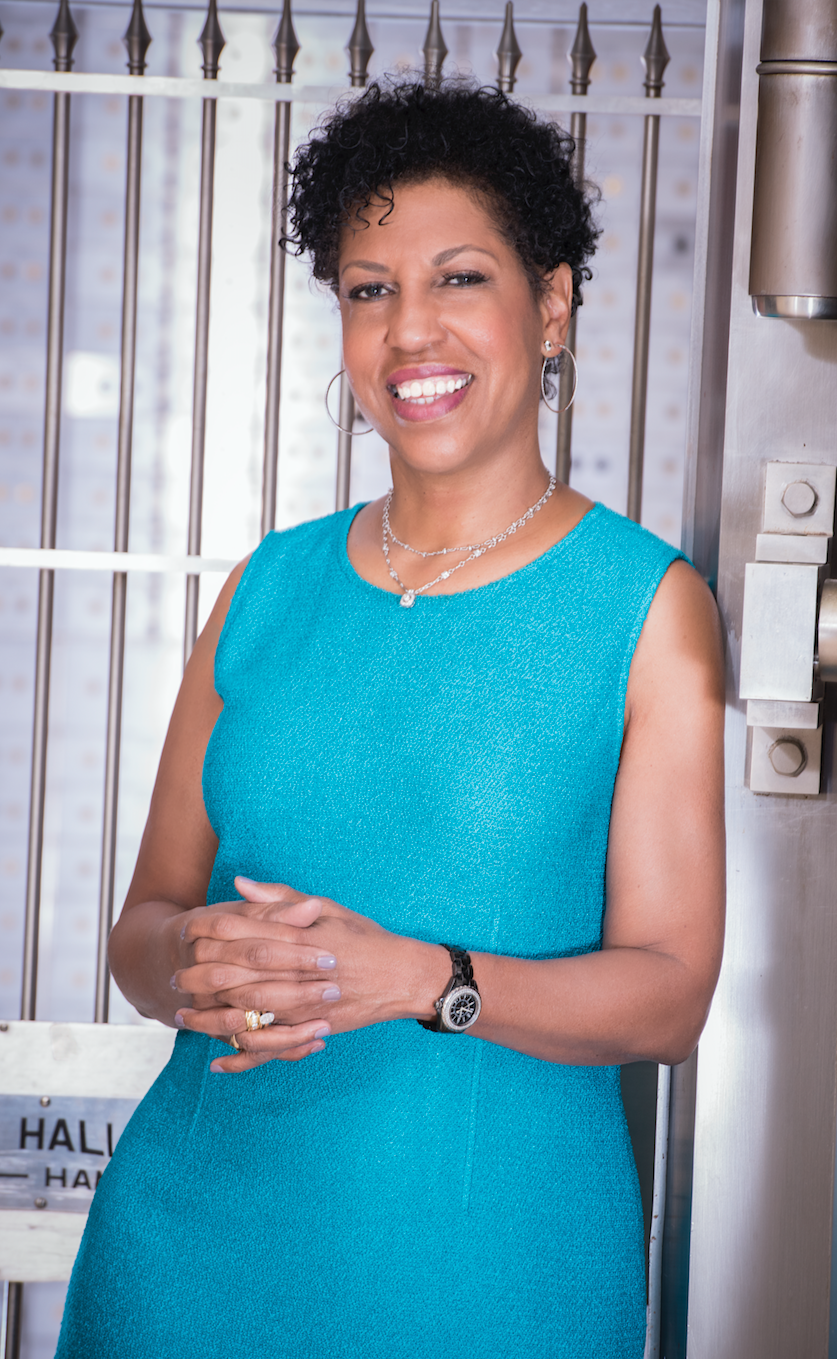
Money Management Tips Every Millennial Should Know
In 2018, Black spending power was valued at $1.2 trillion, showing just how undeniably powerful the Black dollar is.
That same report also states that "African-American consumers are an important population for smart brands that want to grow market share and brand preference…brands can't afford to lose favor or traction with this segment without potential negative impact." With so many corporations looking to Black people and Black culture as a market opportunity - imagine if it was flipped. Imagine how much more powerful the Black dollar could become if we reinvested some of that buying power back into our individual finances and communities. One way to do this is by #bankingblack.
Meet Teri Williams, President and Chief Operations Officer of OneUnited Bank - the largest Black-owned bank in the United States. Through her work at OneUnited, Teri is committed to combating challenges and embracing the opportunities that come with educating and being relatable to people who look like her about the power of #bankingblack. "People start banking at the large banks because that's what they're exposed to," says Teri. "They don't realize there is a whole network of Black banks, credit banks, and community banks that better reflect their values."
Teri spoke to xoNecole about critical money management tips that can give Black millennials a step up when it comes to their financial literacy and building a strong financial base and future.
Check out her tips below!
1. Set up an automatic savings plan.
Though savings can be a bit of a struggle when you're trying to pay bills and other monthly expenses on time, paying yourself first is a MUST! "If the money goes into your pocket first, it's almost impossible to save," says Teri.
Try setting up your paychecks so that a certain amount is automatically deducted and moved into a savings account through direct deposit. "It doesn't matter the amount, it's the idea of taking money out of your paycheck and putting it into a savings account so you don't touch it," Teri explains.
You'll be able to look up a year (or more) from now and be amazed about how much you can spend. Making this process automatic will leave you little room to forget each pay period.
2. Adjust your student loan payments so you can still save.
For many of us paying back student loans is a major financial burden. However, Teri warns, "If you're paying student loans and not saving, you're sacrificing your future for your past."
She urges millennials to find ways to speak to lenders to negotiate payment plans that are consistent with one's current income. Many student loanees don't realize they don't have to pay the bill that's been sent. Speak to lending partners directly to see if there is flexibility in payment amount and payment scheduling. This will help make sure that though you're repaying a significant amount, saving towards your financial future monthly is also possible.

Courtesy of Teri Williams
3. Focus on buying (or investing) in real estate.
For many of us, getting out of the urban and low-income neighborhoods we're from can be seen as a rite of passage or a sign that "we've made it", but Teri thinks otherwise. "We look at our communities and say we want to get out of here, but instead we should be investing."
Gentrification isn't only affecting communities from a physical perspective, but it also affects potential wealth creation for Blacks and Hispanics. In order to fix this, it's important to "not turn your back on the community and run." She explains, "I'm someone who has been in banking in low-to-moderate income communities for the last twenty years. What I'm seeing on the ground is that our communities are being gentrified. We have been thinking about our communities from the past as opposed to the future."
Figure out where the real estate investing opportunities are in your community. "That dilapidated home down the street or that small condo you feel like is too small for your needs is going to be worth a whole lot more in the future." Now is the time to buy, while properties are still somewhat affordable.
This is also where banking at Black or community-oriented institutions is valuable. As a certified community development financial institution, the majority of OneUnited's lending is in low to moderate income Black and Hispanic communities. This is in comparison to other large banking institutions, where only 1-2% of the loans go to Black people. The odds of receiving a loan from a Black-owned bank like OneUnited is much higher. That's why depositing in a bank that looks out for the best interests of the community is crucial.
4. Don’t neglect your credit health.
Having bad credit isn't permanent, so it should be something that you're actively trying to fix and restore to good standing. Though this tip is pretty standard in the financial literacy world, Teri wants millennials to remember just how important an asset it is for one's financial future. If you're looking to rent an apartment, buy a car, or even buy a home - bad credit can significantly impact your ability to. Specifically, OneUnited offers a "How To Rebuild Credit" program that teaches customers safe ways to work on rebuilding their credit score.
If you're looking to use a credit card as part of your credit rebuilding, consider a secured credit card that reports to the major credit bureaus. Beware of prepaid cards with monthly fees that don't report to the credit bureau. Overall, working with a banking institution that offers financial education resources is important if you're in need of credit repair help.

Courtesy of Teri Williams
5. Create your retirement strategy early.
No matter how far away it is, planning for one's retirement future should always be prioritized. If you're working in the traditional corporate 9-5 structure, when choosing a place to work, always ask about the employer's 401k plan and contributions. It's always a plus if an employer contributes or matches contributions. According to Teri, it's basically "free money" and "helps you build retirement funds without money going into your pocket."
For those millennials who work in the "gig economy", which is also known as freelancing, short-term employment, self-employment or any other non-traditional job type - one of the things you're losing beyond health insurance and benefits is an automatic contribution to social security. As social security is an important part of one's retirement plan architecture, making sure you're contributing to your social security fund is critical.
Finding a career you're passionate is also another major key to the health of our retirement financial strategy. "The reality is that most people are going to work longer than they expect," says Teri. "Look for a career where you are paid your value, and would enjoy getting up and doing the work. Long-term, that will allow you to want to stay working longer which will help you with retirement."
Teri's excited about the future of Black banking and the impact Black millenials will have on the industry. "We need to start using our money more purposely. Bank Black. Buy Black. Build Black. Trust each other. Come together…" With confidence, she adds, "We're taught that we as a community are a failure. We're not taught the tremendous accomplishments within our community and contributions we have made to this country.
"We are not going to be defined by our liabilities. We are going to be defined by our assets."
Featured image by Getty Images
- How To Manage Your Money & Protect Your Peace - xoNecole: Women's Interest, Love, Wellness, Beauty ›
- 21 Awesome Money Management Tips to Help Win Personal Finances ›
- 10 Ways Millennials Are Able to Save Money - The Simple Dollar ›
- 6 Money Management Mistakes Millennials Often Make | Family ... ›
- 8 Awesome Money Tips for Millennials | Business Student.com 2019 ›
- 9 Financial Planning Tips for Millennials ›
- 19 Easy Ways To Save Money In Your 20s ›
- How to save money: tips for millennials | Financial Times ›
- Yoav Vilner: 10 money saving tricks for millennials ›
- Council Post: Money 101 For Millennials: Seven Tips For Improving ... ›
- The best financial advice for millennials ›
Rana Campbell is a Princeton University graduate, storyteller, content marketing strategist, and the founder and host of Dreams In Drive - a weekly podcast that teaches you how to take your dreams from PARK to DRIVE. She loves teaching others how to use their life stories to inspire action within oneself and others. Connect with her on Instagram @rainshineluv or @dreamsindrive.
ItGirl 100 Honors Black Women Who Create Culture & Put On For Their Cities
As they say, create the change you want to see in this world, besties. That’s why xoNecole linked up with Hyundai for the inaugural ItGirl 100 List, a celebration of 100 Genzennial women who aren’t afraid to pull up their own seats to the table. Across regions and industries, these women embody the essence of discovering self-value through purpose, honey! They're fierce, they’re ultra-creative, and we know they make their cities proud.
VIEW THE FULL ITGIRL 100 LIST HERE.
Don’t forget to also check out the ItGirl Directory, featuring 50 Black-woman-owned marketing and branding agencies, photographers and videographers, publicists, and more.
THE ITGIRL MEMO

I. An ItGirl puts on for her city and masters her self-worth through purpose.
II. An ItGirl celebrates all the things that make her unique.
III. An ItGirl empowers others to become the best versions of themselves.
IV. An ItGirl leads by example, inspiring others through her actions and integrity.
V. An ItGirl paves the way for authenticity and diversity in all aspects of life.
VI. An ItGirl uses the power of her voice to advocate for positive change in the world.
Let’s make things inbox official! Sign up for the xoNecole newsletter for daily love, wellness, career, and exclusive content delivered straight to your inbox.
Navigating Dating When Emotionally Unavailable & Detached: My Journey Back To Feeling
The last time I came with a dating story, I told you I got my little feelings hurt in 2021. I called myself trying to be out in these streets entertaining a man in a different area code, city, and state — only for homeboy to play in my damn face. So, I went and gave y’all "8 Rules To Casual Dating Every Woman Should Know This Summer." You’re welcome. Fast forward to 2024, and I am now coming to you from a more mature and intentional place. We’re not in summer yet, but I truly believe what blooms in spring, thrives in summer.
2023 was my year, and it was my turn. I had just completed an 8-month holistic detox. The glow-up was real and well-deserved. The way I have poured into myself is unmatched. Let me tell you, self-love is a love you have never known. After a five-year healing journey, I finally felt like myself again, and I was ready to play. My heart was open, my mind was clear, and my body hella transformed. I had told all my friends that I was ready to explore dating again, and at the height of summer, I did exactly just that.
This time I decided I wanted to take my time. I wanted to date the “right way” or the “healthy way.” You know, keep your options open, ask the right questions, believe actions and not words, observe patterns and pay attention to red, yellow, and green flags. I was never the dating app type of girl. I sincerely miss everything about human connection and dating from 2000 to 2012. Can we please bring all of that back into 2024? I prefer to feel a man’s energy and presence in real-time. Nonetheless, I still chose to dabble with a few dating apps. I was all the way outside and dating for practice.
Unfortunately, with today’s dating culture, social climate, and how some of these men move and/or behave, these dates were a dead end. Not one guy made it to my roster. What these men were was benched this season – not one of them could be my first-round select draft pick. It didn't seem like anyone I met was interested in a serious relationship. And it’s completely fine. Miss me with the ghosting, lack of effort, inconsistency, and poor communication. I continued to just do me because what is for me will not miss me.

Kelvin Murray/ Getty Images
The universe must have heard me talking because I had specifically told my closest girlfriends that I wanted to meet someone who lived in the vicinity, no more than twenty minutes away, and no more long distance. And I did meet him (it’s crazy how I manifest exactly what I want). As we started to get to know each other, I liked his energy and effort. I liked the direction it seemed to be going to the point my girlfriends had to tell me not to run from him. Because every part of me wanted to run from something that seemed normal.
I liked what he was coming with until I became uncomfortable with my own feelings, and I didn’t know how to communicate them to him.
With that said, I knew if I truly wanted to experience the truest of loves, a reciprocal, requited love, and be in a healthy relationship this story had to come to a pause. What I didn’t know was that he was going to show me things I didn’t know I needed to work on. I didn’t know he inadvertently was going to help me continue to heal parts of me that were hidden.
As someone who has learned to self-heal, I am no longer the type that runs from herself. I am here for the growth.
The truth is I am emotionally detached from myself, and I am not actively dating at the moment. I am the one that has to work on herself. My reiki healer called it, too – she told me this year would not be a year for a relationship, but a year of continuous growth. And now I see why. After all the healing work I have done thus far – I am an unemotional mess. How?
At my big age of 39, I struggle to communicate my wants and needs.
I still struggle to communicate and process uncomfortable feelings. I would rather give myself anxiety, act nonchalantly, emotionally react, and choose non-communication when I am bothered with someone than address the issue (I will later explain why). I have been ignoring my feelings for so long it has become a habit, a defense mechanism, and more so a trauma response.
If you are someone like me who grew up in a household that didn’t discuss feelings, your emotional needs were unmet, and you don’t feel safe to share your feelings – emotional detachment is quite common.
Oftentimes, we always talk about men being emotionally unavailable, but what if it’s a woman who is emotionally unavailable or emotionally detached? How does she navigate herself, dating, or being in a relationship? As I navigate my emotions this season, let’s explore what it means to be emotionally detached, the signs of detachment, and how to reconnect with yourself emotionally.
Emotional Unavailability vs. Emotional Detachment
When we look at the terminology emotional unavailability and emotional detachment, one might argue that the two terms are interchangeable and have the same meaning. One could also argue that both terms mean that some people are not in tune with their emotions or lack the emotional capacity to be responsive to someone else’s emotions. Fair enough. However, there is a big difference. The definition of emotional unavailability is described as people who have difficulty with sharing their emotions and being receptive to the emotions of those around them.
According to Verywell Mind, signs of emotional unavailability can look like being distant or cold, lack of closeness, and emotional intimacy in relationships, inability to understand and relate to others’ feelings, defensiveness when asked to change or let others in, tendency to shut down or avoid topics that require emotional openness, or withdrawal from people or situations that provoke emotional reactions.
 GIF by Kim's ConvenienceGiphy
GIF by Kim's ConvenienceGiphyWhereas emotional detachment is defined as the inability to or willingness to connect with others on an emotional level. Furthermore, Psychology Today states emotional detachment can also mean that people do not engage with their feelings. Exhibit A – me. Emotional detachment has various causes – past neglect, childhood or adult trauma, PTSD, depression, personality disorder, bipolar disorder, substance abuse, or, in some cases, medication (i.e. antidepressants). It is important to note emotional detachment is a complex issue. For someone like me, it’s a coping mechanism.
It is easier for me to ignore uncomfortable feelings to protect myself from stress or getting hurt. Hence, my nonchalant demeanor. It is also true for some people it is a reaction to trauma, abuse, and unprocessed emotions. Exhibit B – me. As it is difficult for me to open up about my feelings at the moment. On the contrary – emotional detachment can be helpful in navigating some situations like listening to people’s opinions and gossip.
Unfortunately, emotional detachment is not a behavior that can be turned on and off at will. Please note that emotional detachment is NOT a mental health diagnosis but can be a symptom of a mental health condition such as an attachment disorder. And if you know anything about attachment theory, it is related to the relationship we develop in our childhood with our primary caregivers.
Signs You're Emotionally Detached

Mavocado/ Getty Images
According to Psychology Today and Verywell Mind, general signs of emotional detachment can look like difficulty showing empathy to others, sharing emotions, committing to a relationship, feeling numb, poor listening skills, lack of self-esteem, preferring to be alone, struggling to feel positive emotions, inability to identify emotions, lack of physical, verbal, or sexual contact and losing touch with people or maintaining connections.
In a romantic relationship, emotional detachment shows up as you or your partner not being available for connection, poor communication, or reduced affection.
For me, my experience with emotional detachment is collective. I am an empath to my core. I don’t have a problem relating to other’s feelings or circumstances. I don’t have commitment issues, nor do I have an issue connecting with others or maintaining those connections. I struggle with sharing emotions, at least the negative ones.
Due to the emotional abuse from my childhood and a toxic relationship, I learned sharing emotions just wasn't the safe thing to do. As a survivor of trauma, I learned to suppress feeling negative emotions in general as a form of protection.
How To Reconnect To Your Emotions When You're Emotionally Unavailable
 Serious Kid Cudi GIF by Apple MusicGiphy
Serious Kid Cudi GIF by Apple MusicGiphyExploring my emotional side in-depth started late last year simply by noticing my reaction to something that he did. I didn’t know how to properly communicate to him how I was feeling or what he did bothered me in the moment. So, I swallowed my feelings and said absolutely nothing. I intentionally chose to avoid the issue. I chose to rationalize the situation instead of acknowledging that my feelings at the time were valid. I chose to act like everything was all good because it was all good.
“It wasn’t that deep to begin with” is what I told myself. And this is where the problem lies.
The saying is true, “What happens in your childhood shows up in your adult relationships.” I came to realize that because I was not able to express my feelings as a child, I struggled to process them. I either hold back my feelings, take a long time to say how I feel, or don’t say anything at all. This is because I fear people will walk away from me like my mother did if I share what I truly feel. I fear my feelings won’t be validated, or they will be rejected.
With that said, I was completely unaware that I was emotionally detached from myself until recently. So, here we are with this article. It all started by reading Instagram’s @theholisticpsychologist, Dr. Nicole LePera’s newest book How to Be the Love You Seek: Break Cycles, Find Peace, and Heal Your Relationships, which was released on November 28, 2023. As I read through the first chapter, I became triggered.
How Dr. LePera describes her childhood with her parents and experiences with her romantic partners somewhat mirrored my experiences with my own parents and relationships. As Dr. LaPera stated in her book, I have no issue showing up for others or meeting their needs and wants. But when it comes to expressing my own needs and wants – I cannot or I don’t. This is mainly due to my hyper-independence.
At an early age, I learned to show up for myself because the people I trusted to show up for me failed. Given my home environment, I had internalized it is not safe to talk about feelings. I never knew my emotional responses and behavior were abnormal. But because I am willing to continue to do my inner work, I know that I can reconnect to my emotions, and undo four decades of repressed emotions.
If you are someone like me who struggles with emotional connection with yourself and others, here is how you go about it:

Lighthouse Films/ Getty Images
1. Know Your Attachment Style
For me, the first step was to understand my attachment style. I asked my therapist if she could help me identify my attachment style to understand my triggers. She recommended The Attachment Theory Workbook by Annie Chen, LMFT. My therapist administered the associated online quiz – Attachment Quiz. If you haven’t figured out my attachment style yet by reading this article, I have an anxious attachment style.
This means I don’t do well with inconsistent behavior, especially from men (but I’m the type that holds men to standards too). People with an anxious attachment style have a need to feel close to their partner. It may come across as “clingy” or “needy.” However, this same need is often driven by fear of abandonment, mistrust, and low self-esteem. I would say knowing your attachment style is helpful because you can work towards having a secure attachment style (with practice) in your relationships – familial, business, work, platonic, or romantic.
2. Become Self-Aware
Most people who are not in the practice of self-care or self-healing are unaware of their triggers, patterns, and behaviors. We are so caught up in the daily minutiae of life that we forget to pay attention to the most important part of our days — ourselves. As Dr. LePera says, make it a conscious habit to pause throughout your day to check in with yourself. Ask yourself:
- How does my body feel?
- What am I doing right now?
- Am I present?
- Am I distracted and lost with other thoughts?
- What do I think or feel when I recall a specific experience with someone?
- What do I think or worry about?
- What would happen if I shared my authentic thoughts, perspective, feelings right now?”
This is what Dr. LePera refers to as exploring your embodied self or fulfilling your authentic needs in chapter two of her book. Consistent mindfulness and self-awareness are key to self-discovery and in any healing journey. Learning to focus on the present moment also includes paying attention to our emotional response to an event or how we think about emotions in general.
3. Practice Vulnerability
The idea of vulnerability is a tough one for me and so many other women for countless reasons. Whether it be toxic family, friendships, relationships, or trauma – trusting others with your thoughts and feelings is not easy. As much as I am open and transparent, I am not as vulnerable. And I believe there is so much power in the duality to be both. To trust someone, let alone a man with your authentic self is a delicate matter.
But it is emotional vulnerability that allows us humans to build authentic connections, create stronger relationships, and break down emotional walls. Emotional vulnerability is not something to be rushed – it takes time and practice from you and the people you choose to have in your life. Medical News Today suggests that we can learn to be vulnerable by opening up more to our closest friends, building our ability to become more trusting, and developing skills to regulate our emotions.
4. Seek Therapy
I have been in therapy for six years and counting. I would consider therapy one of my safe spaces. I am one of those individuals who recommend therapy to everyone as it has given me the tools and resources I need to navigate my life challenges. By choosing to get help, I was able to put my PTSD and depression in remission for four years now. I have also learned how to manage my anxiety.
I am fully aware that in this season of my life requires me to do the work to unlock new levels of self. And any time where I have consciously chosen growth – the universe or life has not failed me. I was able to heal my body, my heart, and my spirit. Now, it’s time to heal my inner child, this hurt little girl who lives in me.
I will say choosing a therapist is similar to dating; you might go through a few potentials until you find a therapist you connect with. Actually, one of my lifelong friends said to me the other day, “Your relationship with your therapist is one of the most important relationships in your life.” I needed her to say that, and I needed to hear it because it’s true. You are essentially trusting a licensed stranger to help you navigate your life on so many levels.
Be picky and ask the questions. Cut the cord at the first red flag given. Again, let me reiterate that emotional detachment is not a mental health diagnosis. It can be treated with the help of a therapist. Emotional detachment only becomes a problem when it starts to interfere with your daily life. Pay attention to changes in your daily behavior and make decisions to cope accordingly.
I am genuinely excited about reconnecting with my emotions. I want to feel all the feels – good, bad, and indifferent. I want to cry all the tears – especially the sad ones. I want to process and release negative emotions. I want to say how I feel in the moment with no fear.
If you are that girl who struggles with emotional connection or thinks you're emotionally detached, I hope that you become willing to face your inner child and show up for her. Don’t run – she has been waiting for you.
Let’s make things inbox official! Sign up for the xoNecole newsletter for daily love, wellness, career, and exclusive content delivered straight to your inbox.
Feature image by fizkes/ Getty Images









